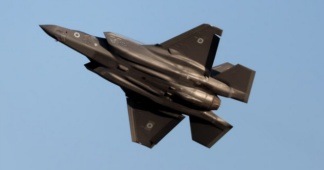By Marwan Emile Toubassi (*)
The Israeli military presence in Cyprus and Greece is no longer a matter of mere security cooperation or passing exercises; it has become a policy of strategic positioning aimed at redrawing the map of influence in the Eastern Mediterranean, as endorsed by the U.S. Congress years ago. This is being achieved through a combination of military power, cross-border energy projects, and expanding real estate investments — expected to reach nearly one billion dollars this year on an individual level — in addition to cyber-intelligence programs, which have recently been linked to scandals involving several officials.
In recent years, Israel has accelerated its moves to tighten its grip on the region’s geopolitical arteries, using its alliances with Athens and Nicosia as dual platforms for security, intelligence, and economic penetration, while maintaining shadowy, unofficial relations with Turkey — a NATO member — under the umbrella of the United States, which itself holds large military bases on both Turkish and Greek soil.
Recently, Israeli Barak MX air-defense systems were deployed at the Paphos air base in Cyprus, as had previously been done at the Souda base in Greece, under the banner of “defense cooperation” and “countering regional threats.” In reality, this deployment grants Israel an advanced capacity to monitor the air and sea space stretching from Turkey’s southern shores to the depths of the Arab East, turning Cyprus into a forward control and surveillance hub serving Israeli interests in any potential future confrontation.
At the same time, joint air and naval exercises between Israel and Greece — joined by other regional actors — have expanded notably in the Aegean Sea, granting the Israeli military broad operational flexibility amid ongoing Greek-Turkish tensions. Israel plays a delicate game on both sides of this rivalry, reassuring each while exploiting their mutual hostility to impose itself as an indispensable third party in regional security, energy, and maritime boundary arrangements across the Eastern Mediterranean.
Yet the matter goes far beyond defense and security. It extends to energy and infrastructure, including the gas and electricity corridors running from Israel to Europe via Cyprus and the Greek islands. These projects are presented as bridges of “regional cooperation” under U.S. sponsorship, but in reality, they represent a blatant violation of international maritime law and an infringement upon the sovereign rights of Palestine and Lebanon in their exclusive economic zones, as recognized by international treaties. Israel — not a signatory to the United Nations Convention on the Law of the Sea, just like the United States and Turkey — seeks to use such projects to cement a new reality, transforming its colonial occupation into an economic instrument alongside its military and security role, with direct backing from Washington and financial support from the European Union.
What adds a deeper layer to this expansion is its unspoken connection to the Zionist-biblical vision of “Greater Israel,” a geo-religious doctrine long used to justify expansion beyond historic Palestine. Certain maps and plans circulated for decades within Zionist religious and political circles depict Cyprus as part of the “sacred security zone” or the “promised land” stretching from the Nile to the Euphrates, along the eastern Mediterranean coast. From this perspective, Israel’s presence in Cyprus and Greece is not merely a contemporary strategic choice but an extension of a theological concept — a biblical ambition translated into tangible geopolitical influence, supported by the U.S.-European alliance.
—
Between the Solidarity of Peoples and the Complicity of Governments
Despite the involvement of the right-wing governments of Cyprus and Greece in these military, economic, and intelligence alliances, popular sentiment in both countries continues to express moral, humanitarian, and political solidarity with the Palestinian struggle. A decade ago, the Greek Parliament even passed a resolution — still unimplemented — to recognize the State of Palestine.
Recently, large-scale demonstrations took place across Greece — from Katakolo to Kalamata — rejecting the docking of Israeli cruise ships, such as the one that arrived last month at the Port of Piraeus. Protesters chanted, “You are not welcome in Greece; you need the police to protect you.” These scenes, echoed across numerous cities and islands, affirm that the conscience of Mediterranean peoples still stands with justice and truth, despite their governments’ attempts to rationalize normalization and military cooperation with a state engaged in war crimes, genocide, colonial settlement, and ethnic cleansing.
However, this popular conscience finds no reflection in official policy. In the United Nations, both Greece and Cyprus have, over the past two years, demonstrated an unusual alignment with U.S.-Israeli policy — abstaining from or voting against several resolutions calling for a ceasefire in Gaza, the protection of Palestinian civilians, and accountability for Israel’s violations in the occupied territories. Their leaders also met with Netanyahu following the International Criminal Court’s decision, while adopting reserved positions toward resolutions recognizing the Palestinian people’s right to self-determination and other related rights. This reflects a profound duality between the proclaimed European discourse of “international law” and the reality of political practice, dictated by the calculus of security and economic alliances with Israel.
—
What is unfolding in the Eastern Mediterranean today is not simply a network of military partnerships, but a reconfiguration of the region’s geopolitical architecture, transcending national borders and peoples’ interests. Israel — long presenting itself as a victim — is steadily transforming into a center of dominance, using technology, economy, and security to expand its influence at others’ expense. The occupation is thus being renewed in a modern guise — a soft occupation financed by economic projects and energy routes, and shielded by the rhetoric of “defensive cooperation” with the U.S. and select European Mediterranean partners.
It is no exaggeration to say that Israel’s expansion in Cyprus and Greece forms part of a broader U.S. strategy to reshape maritime and security dynamics from the Red Sea to the Eastern Mediterranean. Washington closely coordinates with Tel Aviv to secure a permanent presence safeguarding energy corridors and trade routes, while simultaneously encircling Russian, Chinese, and Iranian influence and undermining Arab sovereignty and independence. Thus, Cyprus and Greece — alongside Turkey — have become forward outposts in a project to encircle the Arab East, while Palestine remains excluded from the equation of maritime sovereignty and resources.
What is being drawn today, especially after Gaza, is a new landscape of control, where geography, economy, and diplomacy are wielded as weapons to perpetuate and rebrand occupation in subtler yet more dangerous forms.
What the region’s peoples — and foremost the Palestinians — need today is a redefinition of regional security based on justice and mutual respect for sovereignty through active and resistant diplomacy, not on the terms of Israeli-Western interests. True balance in the Eastern Mediterranean cannot be built upon the marginalization of Palestinian and Arab rights, nor on transforming the Mediterranean into a closed sea dominated by an expansionist occupying power, regardless of how its policies are wrapped in diplomatic rhetoric.
In the end, Israel — tracing its lines of influence through gas, seas, and weapons — continues, in a modern strategic form, to enact the ancient biblical myth that sees geography as divine promise and expansion as a sacred duty, rather than shared humanity and international law serving the stability and prosperity of the region’s peoples.
(*) Former Ambassador of Palestine to Greece
We remind our readers that publication of articles on our site does not mean that we agree with what is written. Our policy is to publish anything which we consider of interest, so as to assist our readers in forming their opinions. Sometimes we even publish articles with which we totally disagree, since we believe it is important for our readers to be informed on as wide a spectrum of views as possible.











